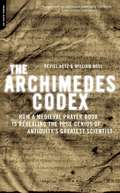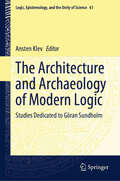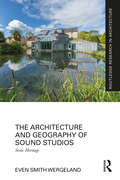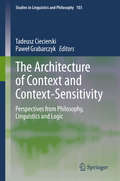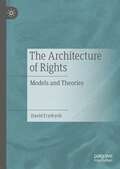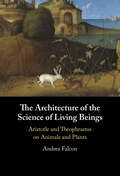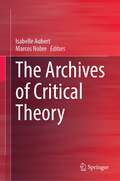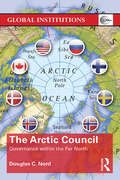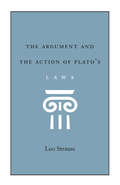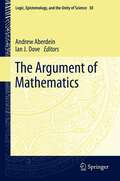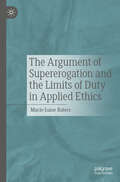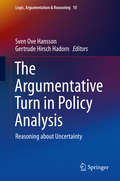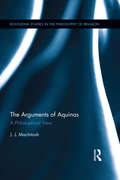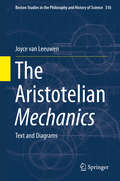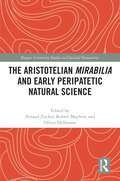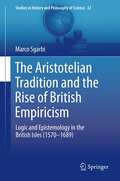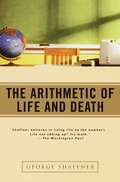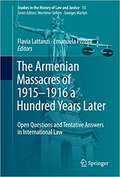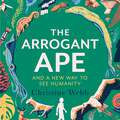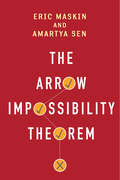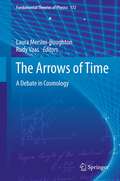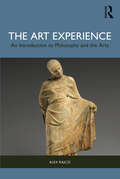- Table View
- List View
The Archimedes Codex: How a Medieval Prayer Book Is Revealing the True Genius of Antiquity's Greatest Scientist
by Reviel NetzPart archaeological detective story, part science, and part history, The Archimedes Codex tells the astonishing story of a lost manuscript, from its tenth-century creation in ancient Constantinople to the auction block at Christie’s in New York, and how a team of scholars used the latest imaging technology to reveal and decipher the original text. What they found was the earliest surviving manuscript by Archimedes (287 BC#150;212 BC), the greatest mathematician of antiquity#151;a manuscript that established, for the first time, the extent of his mathematical genius, which was two thousand years ahead of modern science.
The Architecture and Archaeology of Modern Logic: Studies Dedicated to Göran Sundholm (Logic, Epistemology, and the Unity of Science #61)
by Ansten KlevThis book honors the original and influential work by Göran Sundholm in the fields of the philosophy and history of logic and mathematics. Borne from two conferences held in Paris and Leiden on the occasion of Göran Sundholm’s retirement in 2019, the contributions collected in this volume represent work from leading logicians and philosophers. Reflecting Sundholm’s contributions to the history and philosophy of logic, this book is divided into two parts: the architecture and archaeology of logic.The essays collected in the ‘architecture’ section cover primarily the systematic approach to basic logical concepts taken by Sundholm, including type theory, epistemic assumptions, and notions of consequence. The ‘archaeology’ section includes contributions focused on Sundholm’s contributions to the history of philosophy and logic. Enclosing these two sections are, on the one end, autobiographical remarks of Sundholm's and, on the other, a paper on cooking and philosophy, reflectinganother of Sundholm's passions in life. This book is of interest to logicians, philosophers, mathematicians, and computer scientists.
The Architecture and Geography of Sound Studios: Sonic Heritage (Routledge Research in Architecture)
by Even Smith WergelandThis is a book about sound studios, focusing on their architectural and geographical aspects. It explores how music is materialized under specific spatial and technological conditions and the myths associated with this process.Through ten in-depth studies, it examines the design, evolution and current function of sound studios amidst economic and technological shifts in the music industry. Traditional studios are in flux between the past and future. The industry, while steeped in romanticism and nostalgia, also embraces forward-driven pragmatism and an extensive reuse culture, encompassing heritage audio, building materials and existing buildings. A surprisingly diverse architectural heritage, the most significant feature is the host building, the framework around the studio capsule. Many traditional studios adapt to digitalization with hybrid solutions, reflecting a shift toward smaller, more versatile spaces. In a time when recordings in theory can happen anywhere, destination studios must excel to attract clients, balancing historical legacies with diversification. Although they may be easy to deconstruct, many of the myths endure, sustaining ideas of landmark recordings, unique locations and distinct remnants of sonic heritage. Courtesy of their capacity to keep the past alive in the present, traditional sound studios are best described as museums that work.This book aims to reach scholars and students with an interest in history, theory and preservation, as well as practicing architects and architectural students who wish to find out more about the relationship between sound and space, acoustic design and retrofitting of historical buildings into specialized functions. It also aims to reach practicing musicians, producers, music students and music scholars.
The Architecture of Context and Context-Sensitivity: Perspectives from Philosophy, Linguistics and Logic (Studies in Linguistics and Philosophy #103)
by Paweł Grabarczyk Tadeusz CiecierskiThis volume addresses foundational issues of context-dependence and indexicality, which are at the center of the current debate within the philosophy of language. Topics include the scope of context-dependency, the nature of content and the character of input data of cognitive processes relevant for the interpretation of utterances. There's also coverage of the role of beliefs and intentions as contextual factors, as well as the validity of arguments in context-sensitive languages.The contributions consider foundational issues regarding context-sensitivity from three different, yet related, perspectives on the phenomenon of context-dependence: representational, structural, and functional. The contributors not only address the representational, structural and/or functional problems separately but also study their mutual connections, thus furthering the debate and bringing competing approaches closer to unification and consensus. This text appeals to students and researchers within the field.This is a very useful collection of essays devoted to the roles of context in the study of language. Its essays provide a useful overview of the current debates on this topic, and they put forth novel contributions that will undoubtedly be of relevance for the development of all areas in philosophy and linguistics interested in the notion of context. Stefano Predelli Department of Philosophy, University of Nottingham, Nottingham, UK
The Architecture of Happiness
by Alain De BottonBestselling author Alain de Botton considers how our private homes and public edifices influence how we feel, and how we could build dwellings in which we would stand a better chance of happiness.In this witty, erudite look at how we shape, and are shaped by, our surroundings, Alain de Botton applies Stendhal's motto that "Beauty is the promise of happiness" to the spaces we inhabit daily. Why should we pay attention to what architecture has to say to us? de Botton asks provocatively.With his trademark lucidity and humour, de Botton traces how human needs and desires have been served by styles of architecture, from stately Classical to minimalist Modern, arguing that the stylistic choices of a society can represent both its cherished ideals and the qualities it desperately lacks. On an individual level, de Botton has deep sympathy for our need to see our selves reflected in our surroundings; he demonstrates with great wisdom how buildings -- just like friends -- can serve as guardians of our identity. Worrying about the shape of our sofa or the colour of our walls might seem self-indulgent, but de Botton considers the hopes and fears we have for our homes at a new level of depth and insight. When shopping for furniture or remodelling the kitchen, we don't just consider functionality but also the major questions of aesthetics and the philosophy of art: What is beauty? Can beautiful surroundings make us good? Can beauty bring happiness? The buildings we find beautiful, de Botton concludes, are those that represent our ideas of a meaningful life. The Architecture of Happiness marks a return to what Alain does best -- taking on a subject whose allure is at once tantalizing and a little forbidding and offering to readers a completely beguiling and original exploration of the subject. As he did with Proust, philosophy, and travel, now he does with architecture.From the Hardcover edition.
The Architecture of Rights: Models and Theories
by David FrydrychWhat is a right? What, if anything, makes rights different from other features of the normative world, such as duties, standards, rules, or principles? Do all rights serve some ultimate purpose? In addition to raising these questions, philosophers and jurists have long been aware that different senses of ‘a right’ abound. To help make sense of this diversity, and to address the above questions, they developed two types of accounts of rights: models and theories. This book explicates rights modelling and theorising and scrutinises their methodological underpinnings. It then challenges this framework by showing why the theories ought to be abandoned. In addition to exploring structural concerns, the book also addresses the various ways that rights can be used. It clarifies important differences between rights exercise, enforcement, remedying, and vindication, and identifies forms of legal rights-claiming and rights-invoking outside of institutional contexts.
The Architecture of the Science of Living Beings: Aristotle and Theophrastus on Animals and Plants
by Andrea FalconScholars have paid ample attention to Aristotle's works on animals. By contrast, they have paid little or no attention to Theophrastus' writings on plants. That is unfortunate because there was a shared research project in the early Peripatos which amounted to a systematic, and theoretically motivated, study of perishable living beings (animals and plants). This is the first sustained attempt to explore how Aristotle and Theophrastus envisioned this study, with attention focused primarily on its deep structure. That entails giving full consideration to a few transitional passages where Aristotle and Theophrastus offer their own description of what they are trying to do. What emerges is a novel, sophisticated, and largely idiosyncratic approach to the topic of life. This title is also available as Open Access on Cambridge Core.
The Archives of Critical Theory
by Marcos Nobre Isabelle AubertOn the occasion of the 100th anniversary of the foundation of the Institute for Social Research in Frankfurt am Main, in 1923, this book aims at shedding light on the archives of some of the key thinkers of Critical Theory of Society, also well known as “Frankfurt School”. To pay homage to this current of thought, this contributed volume aims to make the archives speak for themselves, to show the public the quantity of unpublished material still existing by the authors of the Critical Theory which are now in funds in different parts of the world (in Germany, in Italy, or in the United States), and to show that Critical Theory remains alive 100 years after its inception.The volume starts by presenting the archives of Karl Marx and Friedrich Engels, the thinkers who inspired Critical Theory, and the archives of the Institute for Social Research itself. Then it dedicates separate sections to the archives of Walter Benjamin, Max Horkheimer, Theodor W. Adorno, Friedrich Pollock, Herbert Marcuse, Leo Löwenthal and Jürgen Habermas. The book is composed of chapters written by researchers and editors who worked in the different fonds, as well as chapters written by or interviews with researchers who were or are in charge of some of the archives, or who are especially familiar with the material. The Archives of Critical Theory will be an invaluable tool for researchers in many disciplines working with Critical Theory of Society, such as Sociology, Anthropology, Political Science, Philosophy, History, Education, Law and Cultural Studies, among others. Readers will find information about the content of each archive and the history of its constitution. The various contributions present many ways in which the materials may be explored and explain how such explorations affected or may yet affect the state of the research.
The Arctic Council: Governance within the Far North (Global Institutions)
by Douglas C. NordThis book helps us to think carefully about how this area of the world should be best handled in the future by offering a concise and accessible introduction to the Arctic Council. Over the past two decades, the Arctic has evolved from being a remote region in international affairs to becoming an increasingly central concern of the global community. The issues of climate change, access to new energy resources, the development of new global trade routes, the protection of the natural environment and the preservation of indigenous cultures and languages have all come to be focused within this formerly neglected region. Now in its nineteenth year of operation the Arctic Council, an innovative international organization, is going through a period of new growth and challenges. This work identifies the major trends and directions of current Arctic diplomacy and the manner in which national, regional and international leaders and organizations can all make useful contributions in dealing with the complex agenda of environmental, economic and political challenges faced by this increasingly significant area of the globe. This book will be of great interest to students and scholars of international organizations, international relations and the environment.
The Argument and the Action of Plato's Laws
by Leo StraussThe posthumous publication of The Argument and the Action of Plato's "Laws" was compiled shortly before the death of Leo Strauss in 1973. Strauss offers an insightful and instructive reading through careful probing of Plato's classic text. "Strauss's The Argument and the Action of Plato's 'Laws' reflects his interest in political thought, his dogged method of following the argument of the Laws step by step, and his vigorous defense of this dialogue's integrity in respect to the ideals of the Republic. "—Cross Currents "The unique characteristics of this commentary on the Laws reflect the care and precision which were the marks of Professor Strauss's efforts to understand the complex thoughts of other men. "—Allan D. Nelson, Canadian Journal of Political Science "Thorough and provocative, an important addition to Plato scholarship. "—Library Journal "The major purpose of the commentary is to provide a reading of the dialogue which displays its structural arrangement and the continuity of the argument. "—J. W. Dy, Bibliographical Bulletin of Philosophy "The reader of Strauss's book is indeed guided closely through the whole text. "— M. J. Silverthorne, The Humanities Association Review Leo Strauss (1899-1973) was the Robert Maynard Hutchins Distinguished Service Professor Emeritus of political science at the University of Chicago.
The Argument and the Action of Plato's Laws
by Leo StraussThe posthumous publication of The Argument and the Action of Plato's "Laws" was compiled shortly before the death of Leo Strauss in 1973. Strauss offers an insightful and instructive reading through careful probing of Plato's classic text. "Strauss's The Argument and the Action of Plato's 'Laws' reflects his interest in political thought, his dogged method of following the argument of the Laws step by step, and his vigorous defense of this dialogue's integrity in respect to the ideals of the Republic."—Cross Currents "The unique characteristics of this commentary on the Laws reflect the care and precision which were the marks of Professor Strauss's efforts to understand the complex thoughts of other men."—Allan D. Nelson, Canadian Journal of Political Science "Thorough and provocative, an important addition to Plato scholarship."—Library Journal "The major purpose of the commentary is to provide a reading of the dialogue which displays its structural arrangement and the continuity of the argument."—J. W. Dy, Bibliographical Bulletin of Philosophy "The reader of Strauss's book is indeed guided closely through the whole text."— M. J. Silverthorne, The Humanities Association Review Leo Strauss (1899-1973) was the Robert Maynard Hutchins Distinguished Service Professor Emeritus of political science at the University of Chicago.
The Argument of Mathematics
by Andrew Aberdein Ian J DoveWritten by experts in the field, this volume presents a comprehensive investigation into the relationship between argumentation theory and the philosophy of mathematical practice. Argumentation theory studies reasoning and argument, and especially those aspects not addressed, or not addressed well, by formal deduction. The philosophy of mathematical practice diverges from mainstream philosophy of mathematics in the emphasis it places on what the majority of working mathematicians actually do, rather than on mathematical foundations. The book begins by first challenging the assumption that there is no role for informal logic in mathematics. Next, it details the usefulness of argumentation theory in the understanding of mathematical practice, offering an impressively diverse set of examples, covering the history of mathematics, mathematics education and, perhaps surprisingly, formal proof verification. From there, the book demonstrates that mathematics also offers a valuable testbed for argumentation theory. Coverage concludes by defending attention to mathematical argumentation as the basis for new perspectives on the philosophy of mathematics.
The Argument of Supererogation and the Limits of Duty in Applied Ethics
by Marie-Luise RatersDrawing on current research, this book demonstrates that there are rational reasons for why certain actions should reasonably not be considered duties despite their moral value. Would you do something unpleasant or dangerous you are not obliged to, simply because it would benefit others? &“I won't do this because I don't have to&”. This argument of supererogation can be used to reject overly demanding moral expectations. Yet, the argument is not always equally convincing. For instance, refusing to donate a kidney is morally accepted. Refusing a favor to a friend, however, seems indecent. Perhaps supererogatory acts do not exist at all? This book offers a refined framework for understanding the boundaries of moral duty. It is of interest to students and scholars of moral philosophy, applied ethics and meta ethics.
The Argumentative Turn in Policy Analysis
by Sven Ove Hansson Gertrude Hirsch HadornThisbook describes argumentative tools and strategies that can be used to guidepolicy decisions under conditions of great uncertainty. Contributing authorsexplore methods from philosophical analysis and in particular argumentationanalysis, showing how it can be used to systematize discussions about policyissues involving great uncertainty. The first part of the work exploreshow to deal in a systematic way with decision-making when there may be pluralperspectives on the decision problem, along with unknown consequences of whatwe do. Readers will see how argumentation tools can be used for prioritizingamong uncertain dangers, for determining how decisions should be framed, forchoosing a suitable time frame for a decision, and for systematically choosingamong different decision options. Case studies are presented in thesecond part of the book, showing argumentation in practice in the areas ofclimate geoengineering, water governance, synthetic biology, nuclear waste, andfinancial markets. In one example, argumentation analysis is applied toproposals to solve the climate problem with various technological manipulationsof the natural climate system, such as massive dispersion of reflectiveaerosols into the stratosphere. Even after a thorough investigation of such aproposal, doubt remains as to whether all the potential risks have beenidentified. In such discussions, conventional risk analysis does not have muchto contribute since it presupposes that the risks have been identified, whereasthe argumentative approach to uncertainty management can be used to systematizediscussions.
The Arguments of Aquinas: A Philosophical View (Routledge Studies in the Philosophy of Religion)
by J.J. MacIntoshThe Arguments of Aquinas is intended for readers with philosophical interests, who may not be specialists in medieval philosophy. Some think that a medieval saint must be, as such, wrong, dated, and boring; others feel that a saint, any saint, must be right, relevant, and inspirational. Both groups are likely to misread Aquinas, if indeed they read him at all. The works of great philosophers are products of their times, but that does not lessen their value for us. We profit by reading the works of St Thomas in the same interested but critical way that we read the works of our contemporaries. MacIntosh does not hesitated to compare Thomas's arguments with those of later philosophers as well as with those of his contemporaries and earlier philosophers. He chooses topics from a variety of still interesting problem areas: the existence and attributes of God, including God's foreknowledge and human free will, causality and the origin of the universe, time and necessity, human souls, angels, and the problem of evil. Additionally, the volume looks at his views on honesty and lying, and on human sexuality, on which he is, as ever, philosophically interesting whether or not we accept his conclusions.
The Aristotelian Mechanics
by Joyce Van LeeuwenThisbook examines the transmission processes of the Aristotelian Mechanics. It does so to enable readers to appreciate thevalue of the treatise based on solid knowledge of the principles of the text. In addition, the book's critical examination helps clear up many of the currentmisunderstandings about the transmission of the text and the diagrams. The first part of the book sets out the Greek manuscript tradition of the Mechanics, resulting in a newlyestablished stemma codicum that illustrates the affiliations of themanuscripts. This research has led to new insights into the transmission of thetreatise, most importantly, it also demonstrates an urgent need for a new text. A first critical edition of the diagrams contained in the Greek manuscripts ofthe treatise is also presented. These diagrams are not only significant for areconstruction of the text but can also be considered as a commentary on thetext. Diagrams are thus revealed to be a powerful tool in studying processes ofthe transfer and transformation of knowledge. This becomes especially relevantwhen the manuscript diagrams are compared with those in the printed editionsand in commentaries from the early modern period. The final part of the bookshows that these early modern diagrams and images reflect the altered scope ofthe mechanical discipline in the sixteenth century.
The Aristotelian Mirabilia and Early Peripatetic Natural Science (Rutgers University Studies in Classical Humanities)
by Arnaud ZuckerThis is the first volume devoted to the sections of the Aristotelian Mirabilia on natural science, filling a significant gap in the history of the Aristotelian study of nature and especially of animals. The chapters in this volume explore the Mirabilia, or De mirabilibus auscultationibus (On Marvelous Things Heard), and its engagement with the natural sciences. The first two chapters deliver an introduction to this work: one a discussion of the history of the text; the other a discussion of Aristotelian epistemology and methodology, and the role of the Mirabilia in that context. This is followed by eight chapters that, together, are effectively a commentary on those sections of the Mirabilia with close connections to Aristotle’s Historia animalium and to a number of Theophrastus’ scientific treatises. Finally, the volume ends with two chapters on thematic topics connected to natural science running throughout the work, namely color and disease. The Aristotelian Mirabilia and Early Peripatetic Natural Science should prove invaluable to scholars and students interested in the ancient Greek study of nature, ancient philosophy, and Aristotelian science in particular.
The Aristotelian Tradition and the Rise of British Empiricism
by Marco SgarbiOffers an extremely bold, far-reaching, and unsuspected thesis in the history of philosophy: Aristotelianism was a dominant movement of the British philosophical landscape, especially in the field of logic, and it had a long survival. British Aristotelian doctrines were strongly empiricist in nature, both in the theory of knowledge and in scientific method; this character marked and influenced further developments in British philosophy at the end of the century, and eventually gave rise to what we now call British empiricism, which is represented by philosophers such as John Locke, George Berkeley and David Hume. Beyond the apparent and explicit criticism of the old Scholastic and Aristotelian philosophy, which has been very well recognized by the scholarship in the twentieth century and which has contributed to the false notion that early modern philosophy emerged as a reaction to Aristotelianism, the present research examines the continuity, the original developments and the impact of Aristotelian doctrines and terminology in logic and epistemology as the background for the rise of empiricism.Without the Aristotelian tradition, without its doctrines, and without its conceptual elaborations, British empiricism would never have been born. The book emphasizes that philosophy is not defined only by the 'great names', but also by minor authors, who determine the intellectual milieu from which the canonical names emerge. It considers every single published work of logic between the middle of the sixteenth and the end of the seventeenth century, being acquainted with a number of surviving manuscripts and being well-informed about the best existing scholarship in the field.
The Arithmetic of Life and Death
by George ShaffnerWhether you realize it or not, numbers are everywhere--and integral to almost every facet of your life . . . from your next raise in pay to the inevitable rise of inflation, your weekly family budget to your end of the national debt. And as George Shaffner amazingly reveals, there are discerning answers (and a great measure of comfort) in numbers. In The Arithmetic of Life, he applies the basic principles of mathematics--addition, subtraction, multiplication, and division--to some of the most profound and just plain puzzling questions of our time.Illuminated with anecdotes, humor, and insight, each chapter explains a unique part of life that can be understood only through the magic of numbers. Whether it's an unconventional theory on why more things go wrong than right, a simple calculation of how much it will cost you to smoke for a lifetime, why crime (accumulatively) doesn't pay, or a glimpse into the probability of life after death, this enlightening and lucidly reasoned book will forever change the way you think about numbers--and the world around you.From the Trade Paperback edition.
The Armenian Massacres of 1915–1916 a Hundred Years Later: Open Questions And Tentative Answers In International Law (Studies In The History Of Law And Justice #15)
by Flavia Lattanzi Emanuela PistoiaExamines the legal nature and consequences of the Armenian massacres of 1915-1916.<p><p> Deals with various interesting questions of international law raised by the topic.<P> Explores how the massacres and the response to them have affected Turkey’s relations with the European Union.<P>This peer-reviewed book features essays on the Armenian massacres of 1915-1916. It aims to cast light upon the various questions of international law raised by the matter. The answers may help improve international relations in the region. In 1915-1916, roughly a million and a half Armenians were murdered in the territory of the Ottoman Empire, which had been home to them for centuries. Ever since, a dispute between Armenians and Turkey has been ongoing over the qualification of the massacres. The contributors to this volume examine the legal nature and consequences of this event. Their investigation strives to be completely neutral and technical. The essays also look at the broader issue of denial. For instance, in Turkey, public speech on the matter can still trigger criminal prosecution whereas in other European States denial of genocide, war crimes and crimes against humanity is criminalized. However, the European Court of Human Rights views criminal prosecution of denial of the Armenian massacres as unlawful. In addition, one essay considers a state’s obligation to remember by looking at lessons learnt from the Inter-American Court of Human Rights. Another contributor looks at a collective right to remember and some ideas to move forward towards a solution. Moreover, the book explores the way the Armenian massacres have affected the relationship between Turkey and the European Union.
The Arrogant Ape: And A New Way To See Humanity
by Christine Webb'I wish this book had been published five hundred years ago and been compulsory reading ever since' Jay Griffiths, author of How Animals Heal Us'A crucial and transformative read' Charles Foster, author of Being a Beast'Timely, intelligent and entertaining' Tristan Gooley, author of How to Read a Tree'Will leave you in awe' Justin Gregg, author of If Nietzsche Were A NarwhalMost people are certain that humans are the most intelligent, sophisticated, successful species on earth. But what if we're wrong? And what if our arrogant human exceptionalism is leading us to exploit the earth at the expense of other species - and destroy our own world in the process?In The Arrogant Ape, leading primatologist Christine Webb challenges our belief in human superiority by revealing underappreciated wonders of nonhuman life - from the language of songbirds and prairie dogs, to the cultures of chimpanzees and reef fishes, to the acumen of plants and fungi. She shows how human exceptionalism has even crept into the sciences, distorting how we study and understand other species. With fresh research into the rich social, emotional and cognitive lives of animals, and compelling stories from all over the world, The Arrogant Ape demonstrates how our belief in our own importance is directly linked to some of the greatest threats against us and our environment - and offers a hopeful, inspiring way forwards.
The Arrow Impossibility Theorem
by Amartya Sen Joseph E. Stiglitz Kenneth J. Arrow Eric Maskin Prasanta K. PattanaikKenneth Arrow's pathbreaking "impossibility theorem" was a watershed in the history of welfare economics, voting theory, and collective choice, demonstrating that there is no voting rule that satisfies the four desirable axioms of decisiveness, consensus, nondictatorship, and independence. In this book, Amartya Sen and Eric Maskin explore the implications of Arrow's theorem. Sen considers its ongoing utility, exploring the theorem's value and limitations in relation to recent research on social reasoning, while Maskin discusses how to design a voting rule that gets us closer to the ideal -- given that achieving the ideal is impossible. The volume also contains a contextual introduction by social choice scholar Prasanta K. Pattanaik and commentaries from Joseph E. Stiglitz and Kenneth Arrow himself, as well as essays by Sen and Maskin outlining the mathematical proof and framework behind their assertions.
The Arrow Impossibility Theorem (Kenneth J. Arrow Lecture Series)
by Amartya Sen Eric MaskinKenneth J. Arrow's pathbreaking "impossibility theorem" was a watershed innovation in the history of welfare economics, voting theory, and collective choice, demonstrating that there is no voting rule that satisfies the four desirable axioms of decisiveness, consensus, nondictatorship, and independence. <P><P>In this book Eric Maskin and Amartya Sen explore the implications of Arrow's theorem. Sen considers its ongoing utility, exploring the theorem's value and limitations in relation to recent research on social reasoning, and Maskin discusses how to design a voting rule that gets us closer to the ideal—given the impossibility of achieving the ideal. The volume also contains a contextual introduction by social choice scholar Prasanta K. Pattanaik and commentaries from Joseph E. Stiglitz and Kenneth J. Arrow himself, as well as essays by Maskin, Dasgupta, and Sen outlining the mathematical proof and framework behind their assertions.
The Arrows of Time
by Laura Mersini-Houghton Rudy VaasThe concept of time has fascinated humanity throughout recorded history, and it remains one of the biggest mysteries in science and philosophy. Time is clearly one of the fundamental building blocks of the universe and thus a deeper understanding of nature at a fundamental level also demands a comprehension of time. Furthermore, the origins of the universe are closely intertwined with the puzzle of time: Did time emerge at the Big Bang? Why does the arrow of time 'conspire' with the order of the initial state of the universe? This book addresses many of the most important questions about time: What is time, and is it fundamental or emergent? Why is there such an arrow of time, closely related to the initial state of the universe, and why do the cosmic, thermodynamic and other arrows agree? These issues are discussed here by leading experts, and each offers a new perspective on the debate. Their contributions delve into the most difficult research topic in physics, also describing the latest cutting edge research on the subject. The book also offers readers a comparison between the different outlooks of philosophy, physics and cosmology on the puzzle of time. This volume is intended to be useful for research purposes, but most chapters are also accessible to a more general audience of scientifically educated readers looking for deeper insights.
The Art Experience: An Introduction to Philosophy and the Arts
by Alex RajcziThe Art Experience: An Introduction to Philosophy and the Arts takes readers on an engaging and accessible journey that explores a series of fundamental questions about the nature of art and aesthetic value. The book’s 12 chapters explore three questions: What makes something a work of art? How should we experience art to get the most out of it? Once we understand art, how should we evaluate whether it is good or bad? Philosophical theory is illustrated with concrete examples: the paintings of Frida Kahlo, the music of Johann Sebastian Bach, the masks of the Nso people, and many others. Classic questions are balanced with cutting-edge challenges, such as Linda Nochlin’s work on the exclusion of women from the artistic canon.The Art Experience presupposes no prior knowledge of philosophy or art, and it will be of interest to any reader seeking an accessible and engaging introduction to this field. Along the way, readers learn how philosophical theories can affect our real-world experiences with painting, music, theater, and many other art forms.Key Features Accessible for any college student: assumes no knowledge of philosophy, art theory, or any artistic medium Organizes topics conceptually, rather than historically, allowing students to more easily grasp the core issues themselves rather than tracing their historical evolution Offers readers a large number of contemporary examples and a consistent focus on the way theory can affect people’s real-world experiences with art Explores questions about bias – for example, whether the artistic canon has excluded some groups unfairly and whether definitions of art are Western-biased
